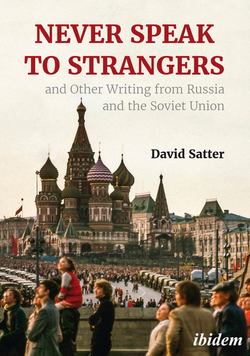Читать книгу Never Speak to Strangers and Other Writing from Russia and the Soviet Union - David Satter - Страница 17
На сайте Литреса книга снята с продажи.
ОглавлениеERZEUGT DURCH JUTOH - BITTE REGISTRIEREN SIE SICH, UM DIESE ZEILE ZU ENTFERNEN
Financial Times, Friday, November 25, 1977
The Soviet strategy on dissidents
From Russia Without Love
While the debate in Belgrade has been going on about Soviet human rights abuses, the Soviet authorities have continued to pursue a strategy intended to make dissent a largely academic issue.
During the course of this year, a wave of arrests and many approvals of requests to emigrate have succeeded in so depleting the dissident ranks that they appear to be greatly weakened for the foreseeable future.
Twelve members of citizens’ groups which sought to monitor Soviet observance of the 1975 Helsinki agreements have been arrested or sentenced since February of this year. In Moscow, those arrested were Dr. Yuri Orlov, the leader of the Moscow-based group, and members Alexander Ginzburg and Anatoly Shcharansky, who faces treason charges. A fourth member, Malva Landa, was sentenced to two years exile in the Soviet Far East for negligence in connection with a fire in her apartment last December.
In the Ukraine; there have been four arrests of members of the Ukrainian-Helsinki group including Mr. Mikola Rudenko, the group leader, and Mr. Olexy Tikhy, who were convicted in July of anti-Soviet agitation. The only Helsinki group members so far convicted on political charges.
Mr. Rudenko, a Ukrainian poet and war invalid, was sentenced to seven years hard labour and five years exile. Mr. Tikhy was sentenced to ten years hard labour and five years exile. There have also been three arrests of Georgian Helsinki group members. And in Lithuania; Viktorus Petkus, head of the Lithuanian Helsinki group, was arrested this summer.
Manv dissidents have been induced to emigrate. Gen. Pyotr Grigorenko leaves next week on a six month visa for medical treatment in the U.S. Gen. Grigorenko insists that he will come back to the Soviet Union and said he regards the granting of the visa as “a humanitarian act.” Once in the U.S. he may be stripped of his citizenship and refused permission to return.
The departure of Gen. Grigorenko, Moscow’s best-known dissident after Dr. Andrei Sakharov, will follow the recent emigration of Dr. Valentin Turchin, leader of the Soviet branch of Amnesty International, who accepted an offer to leave after being unable to find work for three and a half years, and the emigration of Tatyana Khodorovich, the last remaining director of a fund to aid political prisoners, who decided to leave after being threatened with criminal charges.
Other dissidents who have emigrated in recent months include Lyudmilla Alexeeva and Yuri Mnyukh, both former members of the Moscow based Helsinki group, and Kronid Lubarsky, an astronomer who helped Mrs. Khodorovich manage the fund to aid political prisoners.
The Soviet dissident movement appeared in its present form in the late 1960s and has suffered repeated repressions since then. But never before has it lost so many of its key personalities in such a short time. Dr. Sakharov is now almost the only major dissident still active in Moscow and the absence of other well-known personalities such as Dr. Orlov, Mr. Ginzburg, and in a few days, Gen. Grigorenko, removes men whose wide contacts made them invaluable sources of information about human rights abuses throughout the Soviet Union.
The tactics being used against the dissidents are sometimes brutal. But, as a rule the KGB attempts to suppress dissent with a minimum of violence. This can be done by arresting some people, allowing many others to emigrate and making the choice between emigration and arrest almost a matter of whim. Dissidents speak of the “black box” which contains their fate. It is impossible to say with certainty, for example, why Anatoly Shcharansky was arrested and faces treason charges while Dr. Turchin, who succeeded him as the principal dissident spokesman, was allowed to emigrate to the U.S. The inability of the individual to predict the reactions of the KGB, predisposes him toward restraint.
The disorganised state of the dissident movement today comes as a particular irony since it was the 1975 Helsinki agreements with their clear pledges to respect human rights and facilitate the free flow of information which last year gave the movement new life. The Soviet Union is anxious to sign human rights commitments in keeping with its world stature but, for internal reasons, reluctant to honour them. The dissident Helsinki monitoring group, which was founded by veteran dissidents last year, for the first time managed to unite all the principal strands of Soviet dissent—the democratic movement, the Jewish emigration movement, the religious rights movement—into an organisation dedicated to taking the Soviet Union at its liberal word. From the Soviet point of view, the group probably had to be repressed to ward off independent pressure on the Soviet Government to honour its international commitments emanating from within the country.
The dissident, movement may enter a period of relative inactivity in the months ahead. The Helsinki group in Moscow it still functioning but has only four members and there is widespread apprehension about the expected trials of Dr. Orlov, Mr. Ginzburg and Mr. Shcharansky.
The forces which produce new dissidents, however, continue to operate. Sergei Polikanov, a nuclear physicist and corresponding member of the Soviet Academy of Sciences held a Press conference recently to protest the refusal of the authorities to allow his family to accompany him for a year of research at a nuclear laboratory in Geneva. By speaking out against the kind of harassment to which almost all Soviet scientists are subjected, Professor Polikanov put his career at risk and took the first step toward one day joining the ranks of those active dissidents whose numbers in Moscow are so depleted now.
